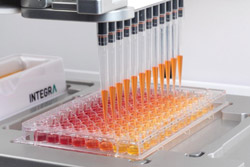
Posted to News on 13th Oct 2018, 08:31
Customised sensor developed for lab automation robot
The exact and efficient transfer of samples in extremely small dosing volumes is essential in the life sciences industry. For this purpose, Integra Biosciences AG developed a compact pipetting robot called Assist Plus that draws and pipettes samples into the target container. Part of this process is the automatic loading and ejecting of pipette tips, monitored by a customer-specific sensor developed by Leuze electronic specially for Integra Biosciences based on the polarized PRK 3B retro-reflective photoelectric sensor.

Modern laboratories, whether in the biotech or pharmaceutical industry or in academia, process and analyse an increasing quantity of samples. Yet the sample volumes and the corresponding labware are becoming smaller. The high sample quantity and strict requirements on accuracy and precision make manual pipetting a great challenge for users. Furthermore, long, manual pipetting protocols can impact the health of the users, as classical, manual pipetting involves collecting and dispensing liquid using thumb movements. This can lead to the development of repetitive strain injuries (RSI). With modern pipettes, special focus is therefore placed on ergonomics by reducing the weight of the devices and by performing the pipetting operation electronically. An advantage of Assist Plus is that the users themselves no longer need to pipette. The pipette can be clicked into the Assist Plus holder, and the protocol is performed automatically. To prevent cross-contamination of samples during critical applications, pipette tips are used only once. Assist Plus does this by automatically ejecting tips into a dedicated waste container after the pipetting operation, then loading new tips before the next use.
The life sciences industry and its wide-ranging disciplines are characterised by constant further development of the analysis methods. Among other things, flexible systems are desired for the tasks performed in the laboratory. Integra Biosciences therefore develops lab devices that are extremely versatile. Stephanie Stursberg, product manager in Integra Biosciences, states: "In recent years, we have concentrated on the development of new, technologically advanced manual pipettes which, on the one hand, are easy to handle and, on the other, meet the ergonomic requirements of our customers." It is especially advantageous that Integra customers can operate the pipettes manually as well as use them as pipetting robots. She continues: "Thus, the lab equipment can be adapted to the current automation needs at any time." Today, the portfolio includes manual and electronic pipettes, semi-automatic pipetting devices with up to 384 channels, as well as automated systems such as Assist Plus. Directly involved in the development of the Assist Plus compact pipetting robot were project manager Andreas Stdler and electronics developer Garry Mller. One of the many challenges was the automatic change of pipette tips and the monitoring of this process. It needed to be ensured that all pipette tips are loaded and, on completion of the process, ejected. Andreas Stdler explains: "To maintain the compact dimensions of the robot, we envisioned an integrated optoelectronic solution, consisting of sensor and reflector, for monitoring the tip handling. Finding such a solution was no easy task. This module needs to be able to reliably detect pipette tips, which are transparent and - in some cases - less than one millimetre in diameter." Economical prerequisites and delivery times also play an important role. To meet all of these requirements, a customer-specific sensor was developed jointly with Leuze electronic.

Follow the link for more information about the PRK 3B polarised retro-reflective photoelectric sensor from Leuze electronic.
Want the latest machine building news straight to your inbox? Become a MachineBuilding member for free today >>
1B Fenice Court
Phoenix Park
Eaton Socon
PE19 8EW
UNITED KINGDOM
+44 (0)1480 408500

















